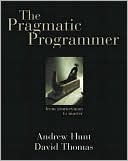What do you think?
Rate this book


This is the eBook version of the printed book. If the print book includes a CD-ROM, this content is not included within the eBook version.
Straight from the programming trenches, The Pragmatic Programmer cuts through the increasing specialization and technicalities of modern software development to examine the core process--taking a requirement and producing working, maintainable code that delights its users. It covers topics ranging from personal responsibility and career development to architectural techniques for keeping your code flexible and easy to adapt and reuse. Read this book, and you'll learn how to
Fight software rot; Avoid the trap of duplicating knowledge; Write flexible, dynamic, and adaptable code; Avoid programming by coincidence; Bullet-proof your code with contracts, assertions, and exceptions; Capture real requirements; Test ruthlessly and effectively; Delight your users; Build teams of pragmatic programmers; and Make your developments more precise with automation.Written as a series of self-contained sections and filled with entertaining anecdotes, thoughtful examples, and interesting analogies, The Pragmatic Programmer illustrates the best practices and major pitfalls of many different aspects of software development. Whether you're a new coder, an experienced programmer, or a manager responsible for software projects, use these lessons daily, and you'll quickly see improvements in personal productivity, accuracy, and job satisfaction. You'll learn skills and develop habits and attitudes that form the foundation for long-term success in your career. You'll become a Pragmatic Programmer.
352 pages, eBook Kindle
First published October 1, 1999
Taking responsibility is the first steppingstone in this voyage. When you take a responsibility for performing a task and its outcome, you're held accountable for it. So take the responsibility. You can find valuable insights all over the book and it sounds impossible to share all of them in a single review.
Then the book takes a pragmatic approach by defining a set of important terms like Duplication, Orthogonality, Reversibility and etc which are described in detail as steppingstones to set the big picture(the software) always strong.